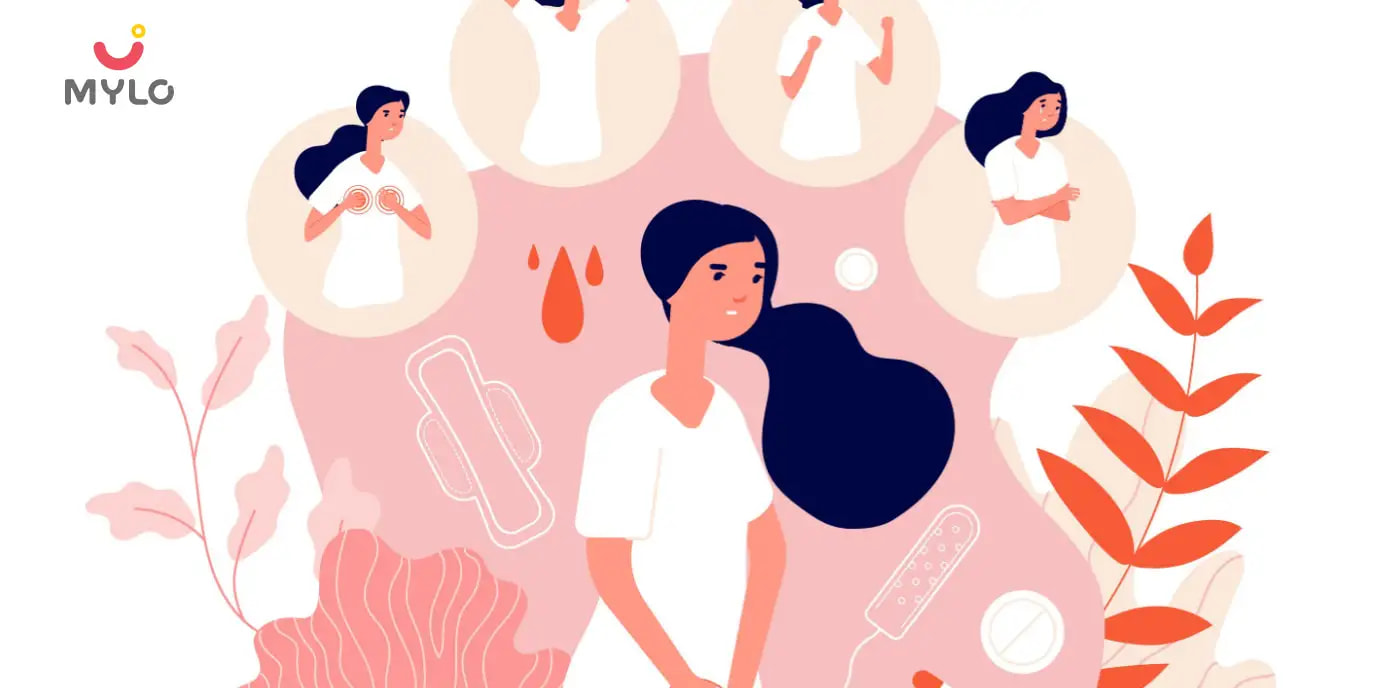- Home

- PCOS & PCOD

- PCOD vs. PCOS: The Ultimate Guide to Understanding the Key Differences
In this Article
PCOS & PCOD
PCOD vs. PCOS: The Ultimate Guide to Understanding the Key Differences
Updated on 3 November 2023
Picture this: you've been experiencing irregular periods, unexplained weight gain, and perhaps even some mood swings that seem to come out of nowhere. Is it PCOD? Or is it PCOS? Are they the same thing, or are there crucial differences you need to be aware of? Fear not, because we're here to be your trusty guides through the twists and turns of PCOD vs PCOS!
In this article, we'll explore the difference between PCOS and PCOD, including their symptoms, causes, and treatments. By the end of this article, you'll have a clear understanding of these two conditions and be better equipped to make informed decisions about your health.
What is PCOD and PCOS?
In order to understand PCOD and PCOS difference, it's important to know what the two conditions really mean and the impact they can have on a woman's body. In polycystic ovarian disorder (PCOD), the ovaries develop cysts due to an abnormally high number of eggs that have not yet reached full maturity. Period irregularities, belly weight gain, infertility, and hair loss are among the symptoms commonly associated with PCOD.
Polycystic ovary syndrome (PCOS), on the other hand, is a condition characterized by elevated levels of testosterone production by the ovaries. Many cysts (fluid-filled sacs) occur in the ovaries due to the male hormone's interference with the egg's ovulation process. Menstrual irregularity is the root cause of the fertility issues that affect women with PCOS.
What is the Difference Between PCOS and PCOD?
Let us understand how we can distinguish between PCOD and PCOS based on the causes, symptoms, prevalence, impact on conception and effects on the body:
Causes
The exact causes of PCOD and PCOS are not fully understood, but both conditions are thought to be related to a combination of genetic, environmental, and lifestyle factors. PCOD is associated with an overproduction of androgens (male hormones) by the ovaries, leading to the formation of multiple small cysts or follicles.
PCOS is a hormonal disorder characterized by high levels of androgens and insulin resistance. Insulin resistance can lead to high levels of insulin, which can cause the ovaries to produce more androgens, creating a cycle of hormonal imbalances.
Symptoms
The difference between PCOS and PCOD symptoms is as follows:
PCOD can cause excessive hair growth on the face or body (hirsutism), hair loss, darker skin around wrinkles, irregular periods, more bleeding, gaining too much weight, and getting acne on the face or body.
On the other hand, PCOS can lead to symptoms like male pattern baldness, acne, skin tags, skin pain, obesity, and infertility. Women with PCOS often experience irregular periods, migraines, and unwanted hair growth like moustaches.
Hormonal Imbalances
While both PCOD and PCOS involve hormonal imbalances, they are caused by different mechanisms. In PCOD, the ovaries produce an excess amount of androgens, which results in the formation of small cysts or follicles. In contrast, PCOS is primarily a result of insulin resistance and high levels of insulin, which can cause the ovaries to produce more androgens. As a result, women with PCOS have higher levels of androgens than women with PCOD.
Menstrual Irregularities
Both PCOD and PCOS can cause menstrual irregularities, but the patterns of irregularities may differ. Women with PCOD may experience infrequent periods, heavy bleeding, or periods that last longer than usual. Women with PCOS may have irregular periods, or they may skip periods altogether. Some women with PCOS may also experience heavy bleeding.
Risk of Diabetes
Speaking of difference between PCOS and PCOD, women with PCOS have a higher risk of developing diabetes than women with PCOD. This is because insulin resistance is a hallmark of PCOS and can lead to high blood sugar levels.
Cardiovascular Disease Risk
Women with PCOS have an increased risk of developing cardiovascular disease due to insulin resistance, high blood pressure, and abnormal lipid levels. While women with PCOD may also be at risk of developing cardiovascular disease, it is not as strongly associated with the condition as it is with PCOS.
Chances of Occurrence
Around 10% of women worldwide suffer from PCOD, making it the most prevalent condition. Yet only about 0.2 to 2.5 percent of women experience PCOS. Additionally, PCOD can be reversed via healthy eating and exercise. Yet, PCOS is a dangerous disorder that cannot be healed. Thus, its onset should be avoided at an early age.
Impact on conception
When we talk about PCOD and PCOS difference, it’s also important to understand the impact they can have on conception. Women with PCOD can get pregnant with medical assistance. On the other hand, women suffering from PCOS may face problems in conceiving due to hormonal irregularities.
Diagnosis
The diagnosis of PCOD and PCOS is based on a combination of symptoms and diagnostic tests. An ultrasound can detect the presence of cysts in the ovaries in both conditions. However, the diagnosis of PCOS requires the presence of at least two of the following three criteria: irregular periods, high levels of androgens, and cysts in the ovaries.
Treatment
The treatment for PCOD vs PCOS depends on the individual's symptoms and the severity of the condition. PCOD can be managed with the right diet and exercise, whereas PCOS may require medication in addition to lifestyle changes.
Treatment for PCOS may include hormonal birth control medications to regulate menstrual cycles, insulin-sensitizing drugs, and medications to reduce excessive hair growth. In some cases, surgery may be necessary to remove the cysts in the ovaries.
Women struggling with PCOS can also try herbal remedies like Mylo's PCOS Tea, an effective blend of Shatavari, chamomile, Shankhpushpi and Manjistha- which can help regulate menstrual cycle, maintain hormonal balance, control acne, aid in weight management and help in mood swings. Alternatively, they can consume Mylo's Chewable Myo-Inositol Tablets, formulated with Myo Inositol, Quatrefolic Active form of folate and Vitamin D to fight PCOS symptoms, enhance cardiovascular health and improve cognitive function.
FAQs
1. PCOD or PCOS, which is more dangerous?
Neither PCOD nor PCOS is inherently more dangerous than the other. Both conditions can present health challenges and complications, but the severity varies from person to person. PCOD (Polycystic Ovary Disorder) primarily involves ovarian cysts and hormonal imbalances, while PCOS (Polycystic Ovary Syndrome) includes additional metabolic issues.
2. Which is curable: PCOD or PCOS?
Neither PCOD (Polycystic Ovary Disorder) nor PCOS (Polycystic Ovary Syndrome) is considered fully curable. However, both conditions are manageable with appropriate medical intervention, lifestyle changes, and sometimes fertility treatments.
3. How can I reduce my PCOD naturally?
To reduce PCOD symptoms naturally, maintain a balanced diet, avoid processed foods and sugary beverages, exercise regularly, drink herbal teas like PCOS tea or try chewable Myo Inositol tablets. Always consult a healthcare professional for personalized advice.
The Bottomline
In conclusion, while PCOD vs PCOS and the difference between the two can be confusing, it is important to understand that they are two distinct conditions with different treatment approaches. Both conditions can be managed through lifestyle changes such as maintaining a healthy weight, regular exercise, and a balanced diet. However, PCOS is considered more serious and may require medication.
References
1. Sadeghi HM, Adeli I, Calina D, Docea AO, Mousavi T, Daniali M, Nikfar S, Tsatsakis A, Abdollahi M. (2022). Polycystic Ovary Syndrome: A Comprehensive Review of Pathogenesis, Management, and Drug Repurposing. Int J Mol Sci.
2. Raj SG, Talbert LM. Polycystic ovarian disease. (1984). Obstet Gynecol Annu.
3. Szczuko M, Kikut J, Szczuko U, Szydłowska I, Nawrocka-Rutkowska J, Ziętek M, Verbanac D, Saso L. (2021). Nutrition Strategy and Life Style in Polycystic Ovary Syndrome-Narrative Review. Nutrients.



Written by
Khushboo Jain
Get baby's diet chart, and growth tips

Related Articles
Understanding RSV And Its Long-Term Impact On Lung Health In Preterm Infants
Preventing Respiratory Syncytial Virus (RSV) In Preemies: Essential Steps For New Parents
How Respiratory Syncytial Virus (RSV) Impacts Premature Babies Differently: What Every Parent Needs To Know
Adverbs: A Comprehensive Guide to help small children learn the usage of adverbs
Related Questions
Hello frnds..still no pain...doctor said head fix nhi hua hai..bt vagina me pain hai aur back pain bhi... anyone having same issues??

Kon kon c chije aisi hai jo pregnancy mei gas acidity jalan karti hain... Koi btayega plz bcz mujhe aksar khane ke baad hi samagh aata hai ki is chij se gas acidity jalan ho gyi hai. Please share your knowledge

I am 13 week pregnancy. Anyone having Storione-xt tablet. It better to have morning or night ???

Hlo to be moms....i hv a query...in my 9.5 wk i feel body joint pain like in ankle, knee, wrist, shoulder, toes....pain intensity is high...i cnt sleep....what should i do pls help....cn i cosult my doc.

Influenza and boostrix injection kisiko laga hai kya 8 month pregnancy me and q lagta hai ye plz reply me

RECENTLY PUBLISHED ARTICLES
our most recent articles

Diet & Nutrition
গর্ভাবস্থায় আলুবোখরা: উপকারিতা ও ঝুঁকি | Prunes During Pregnancy: Benefits & Risks in Bengali

Diet & Nutrition
গর্ভাবস্থায় হিং | ঝুঁকি, সুবিধা এবং অন্যান্য চিকিৎসা | Hing During Pregnancy | Risks, Benefits & Other Treatments in Bengali

Women Specific Issues
স্তনের উপর সাদা দাগ: লক্ষণ, কারণ এবং চিকিৎসা | White Spots on Nipple: Causes, Symptoms, and Treatments in Bengali

Diet & Nutrition
গর্ভাবস্থায় পোহা: উপকারিতা, ধরণ এবং রেসিপি | Poha During Pregnancy: Benefits, Types & Recipes in Bengali

Diet & Nutrition
গর্ভাবস্থায় মাছ: উপকারিতা এবং ঝুঁকি | Fish In Pregnancy: Benefits and Risks in Bengali

Diet & Nutrition
গর্ভাবস্থায় রেড ওয়াইন: পার্শ্ব প্রতিক্রিয়া এবং নির্দেশিকা | Red Wine During Pregnancy: Side Effects & Guidelines in Bengali
- ইনার থাই চ্যাফিং: কারণ, উপসর্গ এবং চিকিৎসা | Inner Thigh Chafing: Causes, Symptoms & Treatment in Bengali
- গর্ভাবস্থায় ব্রাউন রাইস: উপকারিতা ও সতর্কতা | Brown Rice During Pregnancy: Benefits & Precautions in Bengali
- Velamentous Cord Insertion - Precautions, Results & Safety
- Unlock the Secret to Flawless Skin: 7 Must-Have Qualities in a Face Serum
- Unlock the Secret to Radiant Skin: How Vitamin C Serum Can Transform Your Complexion
- Gender No Bar: 10 Reasons Why Everyone Needs a Body Lotion
- Unlock the Secret to Radiant Skin How to Choose the Perfect Body Lotion for Your Skin Type
- Top 10 Reasons to Apply a Body Lotion After Every Bath
- Communication in Toddlers: Milestones & Activities
- How to Improve Vocabulary for Toddlers?
- A Comprehensive Guide to Understanding Placenta Accreta
- Vulvovaginitis in Toddlers Causes, Symptoms and Treatment
- A Comprehensive Guide to Understanding Cerebral Palsy in Children
- Bitter Taste in Mouth During Pregnancy: Understanding the Causes and Remedies


AWARDS AND RECOGNITION
Mylo wins Forbes D2C Disruptor award
Mylo wins The Economic Times Promising Brands 2022
AS SEEN IN
















At Mylo, we help young parents raise happy and healthy families with our innovative new-age solutions:
- Mylo Care: Effective and science-backed personal care and wellness solutions for a joyful you.
- Mylo Baby: Science-backed, gentle and effective personal care & hygiene range for your little one.
- Mylo Community: Trusted and empathetic community of 10mn+ parents and experts.
Product Categories
baby carrier | baby soap | baby wipes | stretch marks cream | baby cream | baby shampoo | baby massage oil | baby hair oil | stretch marks oil | baby body wash | baby powder | baby lotion | diaper rash cream | newborn diapers | teether | baby kajal | baby diapers | cloth diapers |









